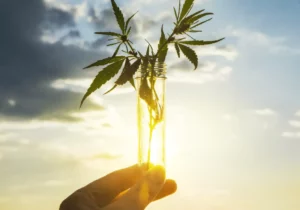In December 2018, President Trump signed the Farm Bill into law. The bill has already resulted in major changes to the hemp industry, allowing for the farming, processing and sale of products made from hemp. Hemp, which contains no more than 0.3% tetrahydrocannabinol (THC) has now been removed from the government’s Controlled Substances Act.
Like many laws, the passage of the Farm Bill initially raises more questions than answers, namely: Does the legalization of hemp mean cannabis will become federally legal? Let’s break down what we know—and what we don’t know.
FOLLOW US ON FACEBOOK & INSTAGRAM
The FDA, Not the Farm Bill, Controls the Regulation of CBD
Cannabidiol (CBD) is found in both hemp and cannabis plants rich in THC. Many farmers are excited about the possibility of growing hemp, which is where the CBD in cosmetics and wellness products comes from.
But it’s the Food and Drug Administration (FDA) that regulates CBD. And recently, the agency concluded that “CBD is a drug.”
The FDA states that it’s illegal to add hemp-derived CBD to any food or health product without its approval. This action may make it harder and costlier for cannabis businesses to move forward with manufacturing CBD products.
States Must Also Create Laws to Regulate Hemp
In addition to the Farm Bill’s regulations, individual states must approve their own laws regarding the farming, manufacturing and regulation of hemp.
As of February 2019, a number of states still don’t allow for hemp cultivation, including:
- Idaho
- Texas
- South Dakota
- Iowa
- Louisiana
- Mississippi
- Georgia
- Ohio
- Connecticut
Local jurisdictions also have the ability to regulate hemp farming within their spheres of influence.
The Farm Bill Brings Cannabis Confusion
With the ink barely dry on the Farm Bill, there have already been two high-profile arrests and seizures of legal hemp during transportation from farms to CBD manufacturing sites.
The arrests occurred despite the Farm Bill’s guarantee that “no state or Indian tribe shall prohibit the transportation or shipment of hemp or hemp products.”
In one instance, a Colorado CBD manufacturer may have to wait months for the release of about 7,000 pounds of Oregon-grown hemp. Even though the plants have been tested four times and have been shown to fall within the federal THC limits, the raw hemp was confiscated by Idaho authorities, who say that the plants may not cross their state borders.
Individual states are still developing their own hemp guidelines. Currently in California, it’s illegal to include hemp-derived oils in food products. And even the cannabis-friendly Golden State has no agency overseeing the regulation of hemp-derived CBD.
Will Cannabis Farmers Start Growing Hemp?
Until the numbers look better for hemp farmers, it’s unlikely that many marijuana cultivators will switch from growing their THC-rich cannabis strains to hemp. For now, the per-acre return on cannabis remains higher than hemp.
RELATED: ONE HEMP FARMER’S TRANSITION FROM CATTLE TO CANNABIS
Too Close for Comfort: Hemp & Cannabis Plants Must Be Kept Apart
The Farm Bill has also created a fascinating challenge for cultivators in the states where cannabis is legal: how to tackle proximity issues between hemp and cannabis plants.
The cross-pollination between two types of cannabis can result in both sharing genetic information. For example, consider what happens when a male hemp plant grown for its fiber, and a female cannabis plant bred for high-THC levels cross-pollinate. This could result in a significant drop in the THC levels of marijuana plants that come in contact with industrial hemp.
This issue has already concerned farmers in areas like Mendocino County, part of California’s famed Emerald Triangle, where county supervisors recently declared a freeze on hemp cultivation, in part because of the complex cross-pollination issues.
Because cannabis pollen can travel between three and 30 miles, this issue has the potential to permanently alter the cannabis industry.
In Oregon, some outdoor cannabis farmers are avoiding cross-pollination by moving to indoor operations. Others are trying their hand at hemp farming, in part because of their transferable skill sets, and also because of the increased ability to secure loans and insurance.
Following the Money: Cannabis-Hemp Acquisitions Are on the Rise
Canada-based Tilray, one of the world’s largest producers of medical marijuana products, recently acquired Manitoba Harvest, the world’s largest manufacturer of hemp food products.
Canopy Growth, Canada’s largest cannabis stock by revenue, just announced that it acquired hemp company AgriNext USA. Canopy states that it intends to build the first hemp industrial park in the United States. AgriNext’s plan is to build more hemp parks, enabling farmers to engage in one-stop destination services that will help both farmers and entrepreneurs.
With Martha Stewart joining Canopy Growth to create hemp-CBD products, it seems that investors aren’t concerned about maintaining separation between hemp and cannabis.
Hemp’s Small Amount of THC Causes Problems
Farmers and companies manufacturing hemp-derived CBD products must ensure that their products test at or below the 0.3% THC as required by the Farm Bill. Currently, no federal guidelines regarding testing exist. The potential for problems in this area increases with the Farm Bill’s allowance for interstate transport of hemp.
Though the Farm Bill’s passage should have clarified that hemp only contains negligible amounts of THC and provided farmers with opportunities to grow a crop that’s currently more lucrative than farming corn, many sticking points remain.
Has the Government Sorted Out How to Regulate CBD?
The FDA estimates it could take years to complete the rulemaking process for regulating CBD. And despite the Farm Bill’s passage, outgoing FDA chief Scott Gottlieb still questions whether the Drug Enforcement Administration has formally descheduled hemp-derived CBD.
Farmers are imploring the U.S. Department of Agriculture to complete its rulemaking, so that spring planting can take place in 2020. In the meantime, they’re asking for:
- Access to crop insurance
- Other federal financial resources
- National standards for THC testing labs
- An end to the restriction of seed imports
These types of rulings have the potential to create a framework that may help pave the way for federal legalization of cannabis, and research on hemp cultivation has the potential to help all farmers identify the best ways to grow cannabis commercially.
It appears that the tiniest fraction of THC and arguments about CBD have created significant problems for the rollout of commercial hemp farming. Looking at these challenges, it becomes easier to understand why federally legal cannabis may remain a pipe dream for a few more years.
Photo credit: Alexandr Grant/Shutterstock.com
If you’re new to cannabis and want to learn more, take a look at our Cannabis 101 index of articles. And if you have questions about cannabis, ask them and our community will answer.






